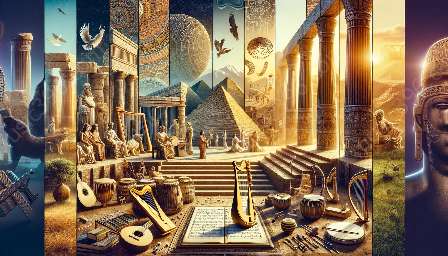Music has been an integral part of human civilization since ancient times, not only for its artistic and cultural significance but also for its profound influence on mathematics and science. In this exploration, we delve into the harmonious theories and contributions of ancient music to mathematics and science, examining its connection to the music in the ancient world and the history of music.
The Interconnectedness of Music, Mathematics, and Science
Ancient civilizations, such as those in Egypt, Mesopotamia, Greece, and India, recognized the interconnectedness of music, mathematics, and science. The Pythagoreans, a school of thinkers in ancient Greece, were particularly devoted to exploring the harmony of the cosmos through music and mathematics. They believed that the universe was based on mathematical principles, and they ascribed mathematical ratios to musical intervals, considering them essential to understanding the order of the universe.
Similarly, in ancient Indian culture, the concept of 'sangeet' encompassed music, dance, and drama, and its roots were deeply intertwined with mathematical and scientific principles. The treatises on Indian music, such as the 'Natya Shastra' attributed to Bharata Muni, recognized the underlying mathematical structure of musical notes and their resonance with the natural world.
Music in the Ancient World
Music in the ancient world was multifaceted, encompassing religious, ceremonial, entertainment, and educational purposes. In Egypt, music played a crucial role in religious rituals and ceremonies, with specific musical scales and melodies associated with different deities. Mesopotamian cultures, such as the Sumerians and Babylonians, used music in their religious rituals and believed in the divine origins of musical knowledge.
Ancient Greece, known for its rich cultural legacy, regarded music as an essential element of education and philosophical discourse. The renowned philosopher Plato emphasized the importance of music in shaping the moral and intellectual development of individuals, and the modes and rhythms of ancient Greek music were believed to have a profound impact on human psychology and behavior.
Harmonious Theories: The Pythagorean Connection
The Pythagoreans' contribution to the harmonious theories of music significantly impacted both mathematics and science. Pythagoras himself is credited with the discovery of the mathematical relationship between the lengths of vibrating strings and the pitch of the musical notes produced. This fundamental insight laid the groundwork for the understanding of musical harmony and paved the way for further explorations in mathematics and acoustics.
Contributions to Mathematics
Pythagoras's famous theorem, which relates to the relationship between the sides of a right-angled triangle, is perhaps his most well-known mathematical contribution. However, the Pythagorean school's fascination with numerical relationships and geometric proportions extended beyond the realm of triangles and influenced the development of mathematical theories related to harmony and proportion in music.
Contributions to Science
The Pythagorean approach to understanding the cosmos through harmonious proportions and numerical relationships laid the foundation for early scientific endeavors. Their insights into the mathematical structures of music and their belief in the mathematical underpinnings of the universe contributed to the development of scientific thinking, influencing notable figures such as Johannes Kepler and Isaac Newton in later centuries.
Legacy and Influence
The legacy of ancient music's contributions to mathematics and science endures in the modern world, with contemporary research in fields such as acoustics, neuroscience, and psychoacoustics drawing upon the interconnected principles of music, mathematics, and science. The harmonic theories and mathematical insights of ancient civilizations continue to inspire interdisciplinary inquiries and deepen our understanding of the fundamental connections between music, mathematics, and science.




































